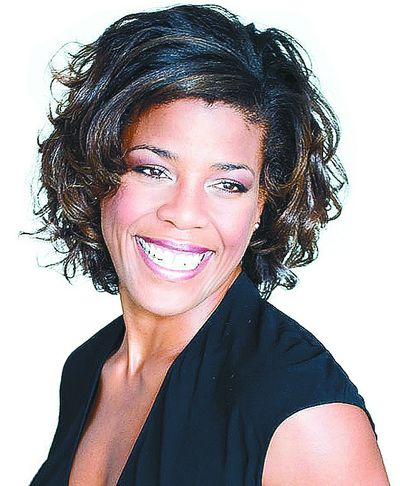Rising star Henry headlines SJO’s season-opening show

At first look – and listen – jazz singer Nicole Henry seems a paragon of perfection. She is tall, willowy and poised, with an expansive smile that gleams like the polished skin on her beautifully sculpted body.
The voice that pours out of her is even more impressive: a burnished, honey-rich alto that can soar to gospel heights, romp with skin-tingling rhythm and drop to a heart-rending whisper, the vocal love child of Whitney Houston and Sarah Vaughan.
But when Henry switched from pop to jazz nine years ago, she had to wear black onstage because performance anxiety made her sweat so much. She is driven not only by her love of music, but by a need to make other people love it, too – to please and fulfill them.
“I always felt I existed to make other people happy and feel beauty,” says Henry, the guest vocalist for the Spokane Jazz Orchestra’s season-opening concert Saturday.
“Singing was going to allow me to do what my life’s purpose is, entertaining, but also interpreting life through song, making people feel understood, making people feel heard and appreciated and loved and comforted.”
Henry performed tirelessly around South Florida for years, singing in churches, jazz clubs and hotels. Since 2009 she has been a regular in New York, building a following among critical jazz audiences. She also tours in Japan, where she has become a star, and has expanded to Europe.
Last month, she celebrated the release of her fifth album, “Embraceable,” with a show at Dizzy’s Club Coca-Cola at New York’s Lincoln Center, part of Wynton Marsalis’ famed Jazz at Lincoln Center program.
Todd Barkan, the programming director of Dizzy’s and a veteran producer of more than 1,000 jazz recordings, says Henry is poised to join the pantheon of contemporary jazz stars such as Diana Krall and Norah Jones.
“She comes closer to being a young Sarah Vaughan than any other singer I’ve worked with,” Barkan says.
Since he produced Henry’s album “Teach Me Tonight” in 2005, he says, she has grown immensely.
“In the last four to five years she’s gotten more and more credibility and scope and depth as a jazz singer,” says Barkan. “She’s got every capability because of her dynamism as a performer, the depth and scope of her voice and her work ethic.”
Henry took some time to fully connect with music. She grew up in the comfortable Philadelphia suburb of Bucks County. Her father, who played professional basketball for two years with the Philadelphia 76ers, was a high school athletic director, and her mother was a social worker.
Although Henry sang in school choirs, at football games (she was also a cheerleader) and in church and played the cello, she did not plan to be a singer. Attending the University of Miami, she studied architecture, then switched to advertising and theater.
After graduating in 1997, she got a job as assistant to the director of the Florida branch of NARAS, the music advocacy organization that presents the Grammys. At the same time, she worked as a cashier at the South Beach club Groove Jet, where DJ and producer Noel Sanger picked her to sing on some dance music recordings.
One of those tracks, “Miracle,” hit the Top 10 on Billboard Magazine’s club play charts. Henry started touring with Sanger, then as a backup singer with an R&B band, moving on to sing soft pop with a guitarist.
In 2002, after performances at the South Beach club Jazzid, she began listening to the jazz acts there and found her musical home.
“When I heard jazz I realized you don’t have to make people dance every minute,” Henry says. “It was something new to me. I fell in love with the theatricality, and there were such great lyrics. I fell in love and I continue to fall in love with it.”
When she couldn’t find a label for her first, self-produced album, “The Nearness of You,” in 2004, she released it herself, as she has two of the three albums she has done since then.
“Embraceable” was financed and released through ArtistShare, a program that allows fans and supporters to contribute money to album production in exchange for access to the recording process and the artist.
The title refers to the Gershwin standard “Embraceable You,” but also to Henry’s wish to “embrace myself.” That means continuing to find her identity and path in music.
“I’m just singing,” she says. “I’m just trying to hear Nicole’s voice when it comes out.
“I’m making sure I don’t hear Diana Krall’s or Dinah Washington or Billie Holiday or Ella Fitzgerald or Diane Reeves. I want to hear Nicole.”